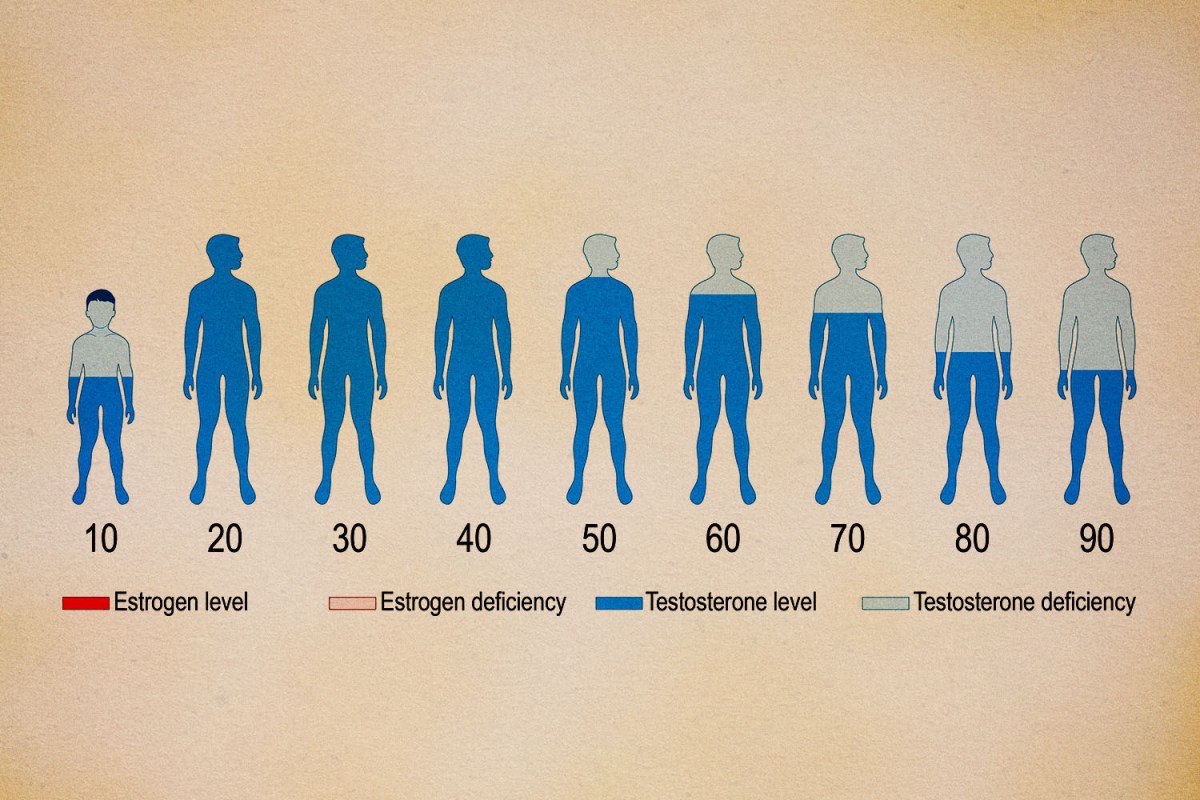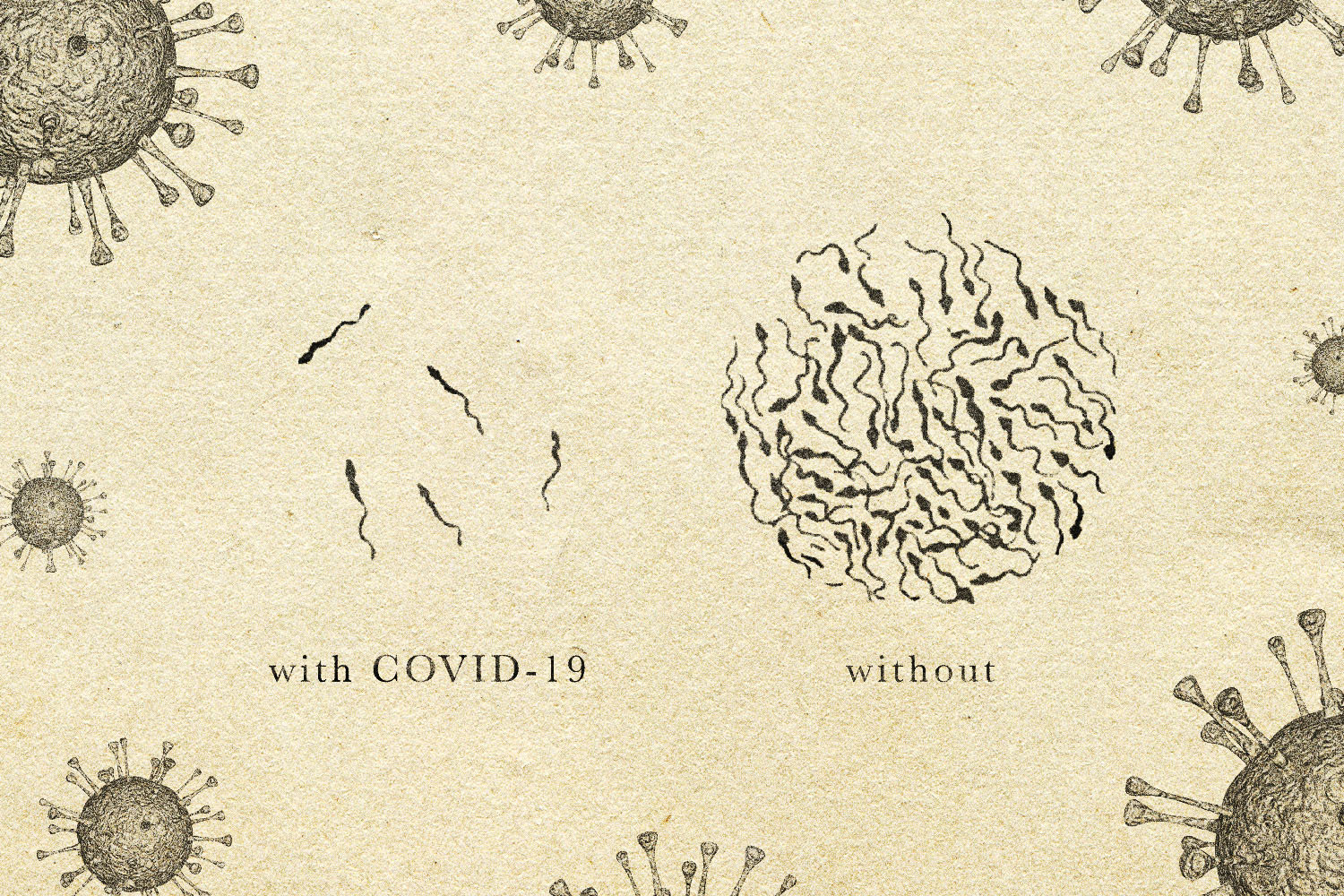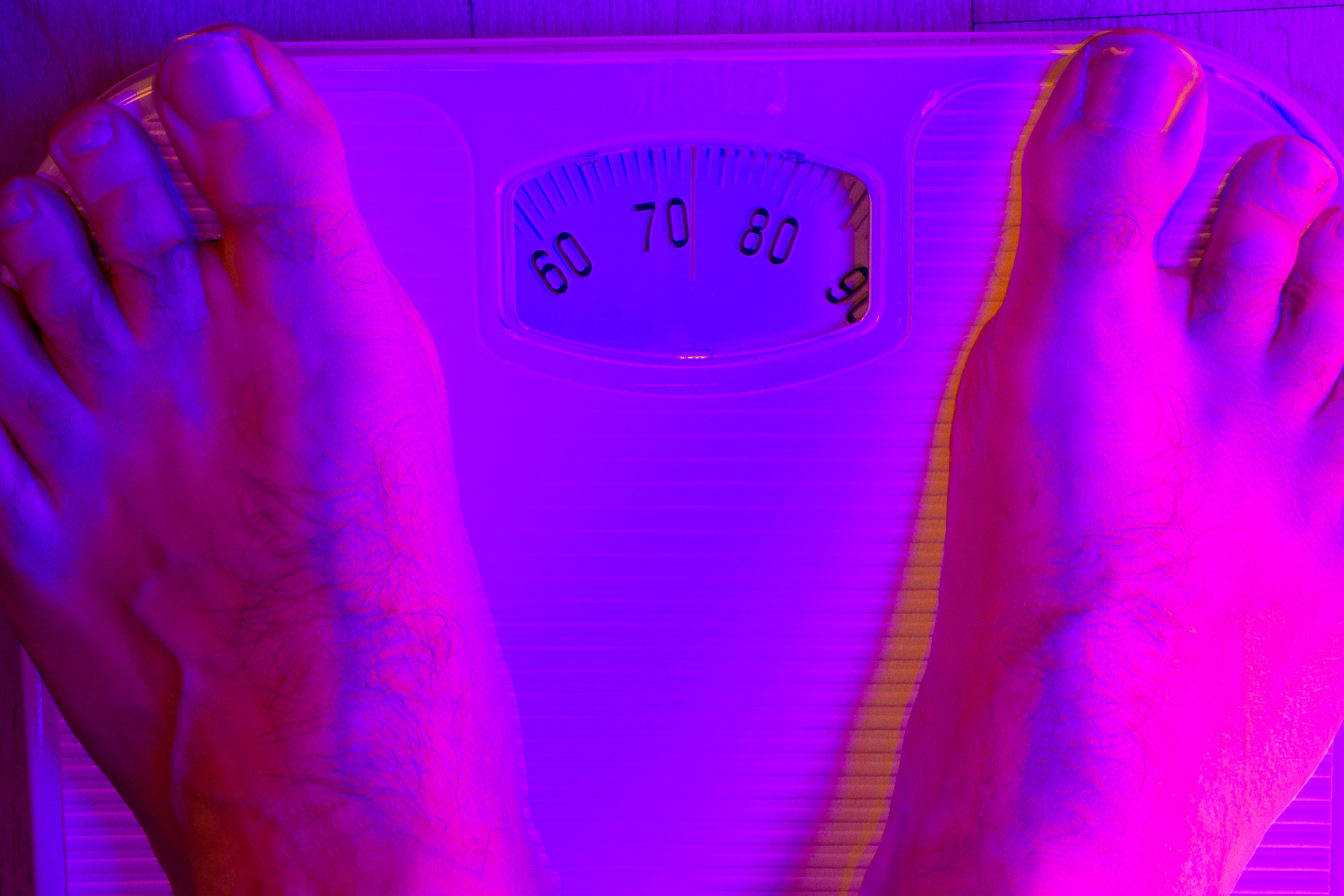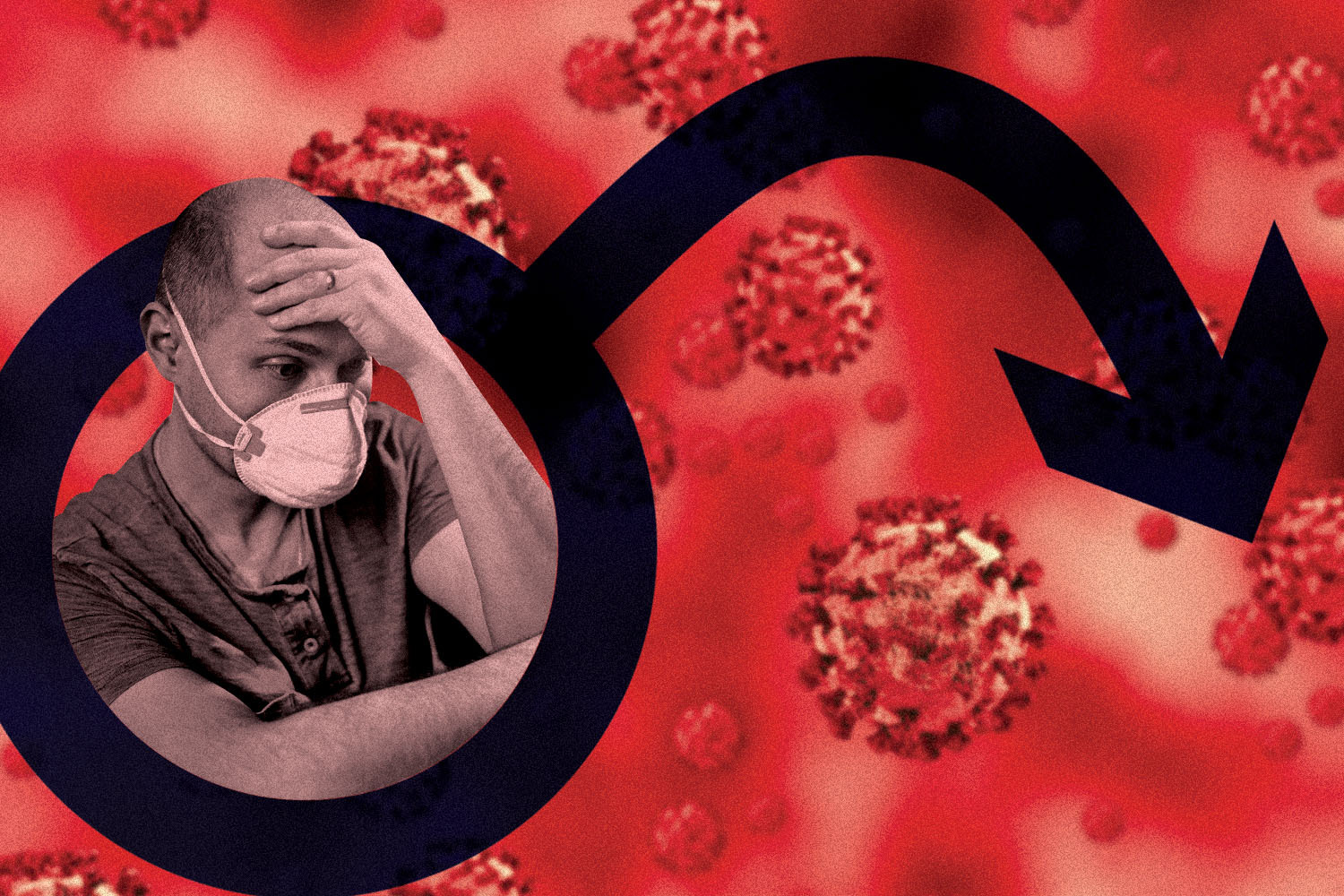We’ve all heard of menopause, most likely in the form of insensitive jokes about hot flashes, mood swings and/or the state of being an aging woman in general. As a sympathetic adult man (especially one with a female partner) who has hopefully grown out of these dated stereotypes, however, you’re ideally already aware that educating yourself about the realities of menopause will behoove you, your partner and your relationship. But is menopause something you, a man, have to worry about personally?
As interest in testosterone replacement therapy has peaked in recent years, so has conversation (and concern) surrounding what is sometimes referred to as “men’s menopause,” “andropause” or, less formally, “manopause.” But is “men’s menopause” really a thing? The answer is both “No, not at all” and also “Well, sort of, maybe.” We (with the help of a few experts in the medical field) can explain.
Do men go through menopause?
Technically speaking, no, men do not go through menopause, largely because “menopause” — which literally means the pause or cessation of the menstrual cycle and thus fertility — refers specifically to a sudden and rapid decline in hormone levels experienced only by women and/or people with ovaries and related reproductive organs.
(It’s important to note that people born with this specific set of organs may not necessarily identify as women and may still experience menopause. For the purposes of this article, however, I will primarily be referring to cis man- and womanhood, and the biological experiences that generally accompany each, which people of any gender identity may experience.)
While the related term “andropause” attempts to create a more male-centric alternative by referring to androgens — a group of hormones (namely testosterone) that play a role in male traits and reproductive activity — experts like Dr. Alexander Tatem, a board-certified urologist specializing in male reproductive medicine, still say the term represents something of a misnomer.
“It tries to be a direct corollary to what women go through during menopause,” Tatem tells InsideHook. “Men experience something very different.”
While a man will experience a gradual decline in testosterone levels with age, usually beginning sometime in his forties or fifties, that decline is much less sudden and dramatic (and is often accompanied by significantly less intense symptoms) than what women endure during menopause.
“Male menopause, also known as ‘andropause,’ is really a misconception,” says Dr. Mohit Khera, MD, MBA, MPH, a board-certified urologist and Professor of Urology at Baylor College of Medicine. “It assumes that testosterone levels significantly decline due to aging.”
The reality, says Khera, is that “testosterone levels in males do not significantly decline due to aging alone,” as do women’s respective hormone levels around the time they hit middle age.
What hormonal changes can men expect with age?
As usual, men have won the genetic lottery in that most can expect to enjoy a gradual hormonal decline with age relatively free of dramatic symptoms.
“Men will lose about one percent of their testosterone production per year after about age 30,” says Tatem, adding that it is usually “a very slow, steady decline in a normal, healthy man.”
Still, just because most men can expect to experience a gradual, relatively innocuous hormonal decline with age doesn’t mean they have nothing to worry about. While men in general are typically spared the steep and symptom-ridden hormonal dropoff women endure as a natural part of their aging process, some men may still experience more worrisome declines in testosterone, or develop other conditions with age that could contribute to lower hormone levels.
“You can absolutely get to a point where you have a testosterone level that is low enough to be pathologic. That is a problem that is called hypogonadism or testosterone deficiency, which is a medical condition that deserves treatment,” says Tatem.
Moreover, adds Khera, “Many men acquire medical conditions such as obesity, diabetes and metabolic syndrome as they age. These acquired conditions can significantly drop serum testosterone levels. Thus, it is true that as men become older, they are more likely to have lower testosterone levels” — even if those lowered testosterone levels aren’t due specifically to aging alone.
Men experiencing testosterone deficiency may experience symptoms including fatigue, erectile dysfunction, low libido, increased fat deposition, decreased muscle mass and depression, says Khera.
According to Dr. Zaher Merhi, an MD, OBGYN and founder of the Rejuvenating Fertility Center in Westchester, New York, such symptoms sometimes associated with “men’s menopause” do not affect all men (the way menopausal symptoms do the majority of women) and are often mild. Still, significant symptoms may be cause for medical evaluation.
“It’s true that men will have a natural decline in their testosterone levels as they age, but there is a difference between a natural decline and something that is a problem that isn’t normal or healthy,” says Tatem. “It is not normal or healthy as a man to lose your erection, not normal or healthy to lose your energy, to lose your sex drive, to lose muscle mass, to gain fat [without trying to or for no obvious reason]. Those things aren’t normal; they’re pathologic.”
When to seek treatment for low testosterone (and when not to)
While a hormonal decline with age isn’t something most men will experience in the same way women do, real cases of low testosterone are something that should be addressed and managed by a health professional, especially because, as Khera notes, “Low testosterone can be a marker of overall poor health in men,” one that is associated with increased cardiovascular risk.
If men are experiencing the symptoms outlined above, says Tatem, “They should absolutely have their testosterone checked by a qualified professional who has their best interest at heart. And if they have low testosterone, then they absolutely should receive treatment.”
According to Merhi, “Conservative measures such as healthy diet, exercise and stress relief can help” in mild cases, while men experiencing more severe symptoms should consider having their testosterone levels tested by a medical provider who might recommend testosterone therapy.
Figuring out who counts as a qualified professional and what kind of treatment is needed, however, is the tricky part. According to Tatum, a growing number of cash-grabbing clinics are attempting to cash in on the testosterone trend by promoting testosterone supplements as something all men need after a certain age.
“I love testosterone. I think it is an amazing drug when used appropriately and judiciously,” says Tatem, who notes that he has worked with a prescribed testosterone to a wide variety of male patients. “But I think that we are experiencing a change in society where there’s increasing pressure on men from commercially backed clinics to push [testosterone therapy] onto people who maybe don’t need it and maybe create some problems.”
Those problems, according to Tatem, largely stem from the fact that testosterone is (and is often used as), in effect, a performance-enhancing drug. As with any other drug, taking testosterone in excess or when it isn’t needed can result in dependency. If you continue taking increasingly higher doses of testosterone in attempt to satiate that dependency, you run the risk of developing serious conditions related to high cholesterol and high blood pressure that can lead to kidney failure or heart disease.
Further complicating matters is the fact that there’s some disagreement among medical professionals about what actually constitutes low testosterone levels. “Because there’s debate,” says Tatem, “it’s very easy to make a case to give some guys testosterone who don’t necessarily need it.” This is great for cash clinics looking to profit off of men’s fears about their declining masculinity, but not so much for men seeking legitimate medical care to address their concerns.
Still, none of this is to say that testosterone therapy is inherently bad and no men should pursue it under any circumstances. If men are experiencing symptoms or have concerns about low testerone, “they should absolutely go see a doctor and get tested,” says Tatem. The key is to seek care from the right sources.
“You should never go to visit a ‘clinic’ where you don’t know who the doctor is,” says Tatem. “Think twice and try to seek care from someone who specializes in men’s health, who is trained in this area, and who you know is a professional that cares about doing the right thing, and not so much about getting you to sign up for a monthly subscription service.”
The Charge will help you move better, think clearer and stay in the game longer. Subscribe to our wellness newsletter today.



























